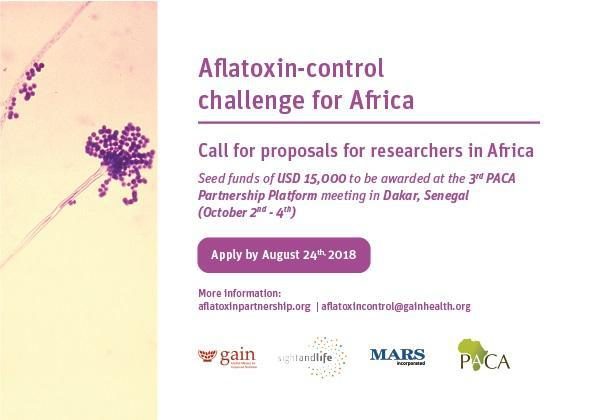Deadline: August 24, 2018
Applications are open for the Partnership for Afloxacin Control in Africa (PACA) Aflatoxin-control Challenge 2018 for Researchers in Africa. The Aflatoxin-control challenge proposes to stimulate the development of innovative approaches for reducing or eliminating exposure to aflatoxin-contaminated foods and feed in Africa.
Attention to aflatoxin has increased in recent years, with growing recognition of their health risks as well as the barrier they pose to market development. The 2020 imposition of new, stricter aflatoxin regulations in the European Union has raised concerns about the future for African exports of crops. Due to their high stability, aflatoxins are not only a problem during harvest, but also during storage, transport, processing, and other steps along the value chain. Consequently, to minimize both the health and economic risks, innovative evidence-based technologies are urgently required to minimize aflatoxin exposure.
Categories
To stimulate innovation from different fields, the challenge calls for research proposals that fall within the following two categories:
- Non-food category: Aimed at finding alternative, non-food solutions to keep aflatoxin contaminated foods and feeds out of the food system
- Food category: Aimed at identifying solutions to eliminate or reduce exposure to aflatoxins from foods and feeds
Prizes
- Seed funds of USD 15,000 will be awarded at the 3rd PACA Partnership Platform meeting in Dakar, Senegal from October 2- 4, 2018
Eligibility
- Open to students and researchers residing in Africa;
- The proposal must address one of the categories above.
Selection Criteria
The review process consists of three steps:
- The first step consists of screening submissions to evaluate whether proposals are complete, follow application guidelines, and address research topic. They exclude responses that are incomplete, do not follow guidelines or address unrelated topics.
- In the second step, responsive proposals are reviewed by at least two reviewers. Reviewers comprise both experts in the topic area or in complementary areas. As not all reviewers have deep expertise in the topic, the proposals should provide a strong background and clear rationale for non-expert audience. Proposals will be sent to the reviewers without the applicant´s personal or organizational information. The criteria considered in these reviews are:
- Topic responsiveness – How well does the proposal address a key need illustrated in the challenge description?
- Innovation approach – Does the idea offer an unconventional, creative approach to the problem outlined in the challenge
- Rationale for innovation – Does the proposal describe how the project varies from current approaches, offers new premises or hypotheses to test, and does it provide a rational basis for expecting success?
- Execution plan – Is the work described feasible within the budget and timeline described?
- The third step is the validation and final selection by the Selection Committee, with representatives from GAIN, Sight and Life Foundation, Mars, and PACA.
Application
Applications must be written in English or French and include the following sections:
- Summary of the research project (max 200 words)
- Background and motivation (max 400 words)
- Specific aims (max 400 words)
- Methods with proposed activities and budget (max 400 words)
- Novelty and potential application if successful (max 400 words)
Applications must be submitted to [email protected].
For more information, visit Aflatoxin-control Challenge.

